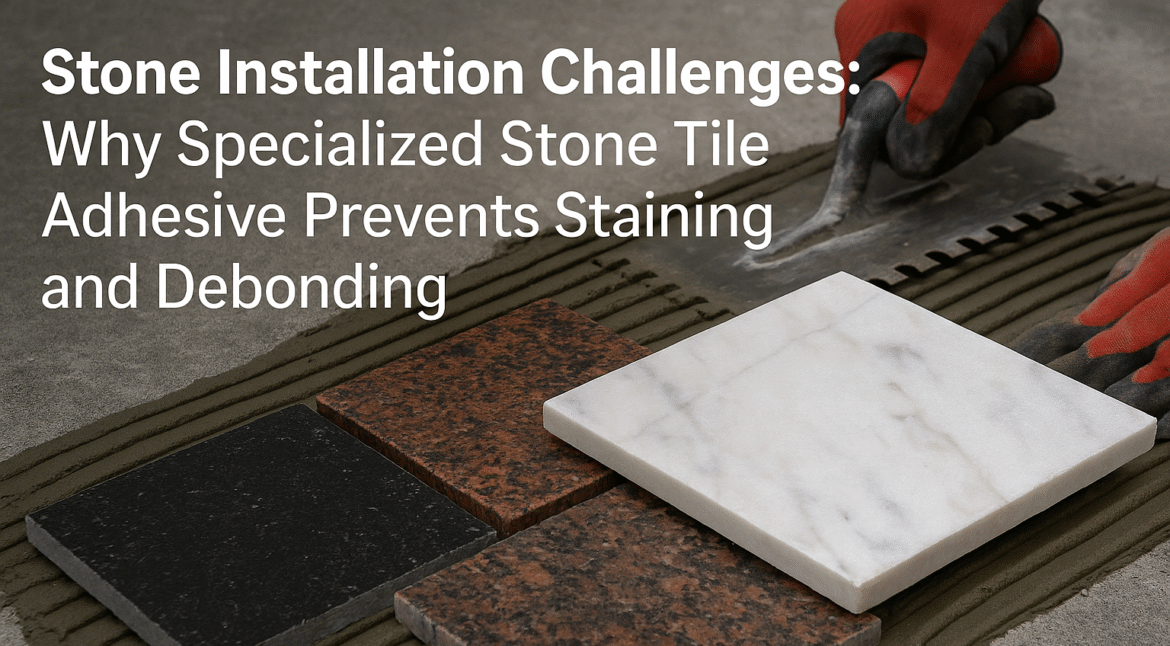Stone Installation Challenges: Why Specialized Stone Tile Adhesive Prevents Staining and Debonding
Installing natural stones such as marble, granite, and quartz gives spaces a premium and timeless appeal. But while these materials enhance aesthetics, they also bring serious installation challenges. Many projects in India experience stone discoloration, efflorescence, or tile popping within months — all because the wrong adhesive was used.
Builders and contractors often assume that regular floor or wall tile adhesive will work for natural stone. However, the dense surface, high weight, and moisture sensitivity of stones demand a different approach — a specialized stone tile adhesive that ensures lasting performance.
Common Question Asked:
Q1. Can regular tile adhesive be used for natural stone installation?
No. Regular tile adhesive often contains gray cement and high moisture content, which can lead to staining, poor bonding, and debonding of natural stones like marble or granite.
Understanding the Core Challenges in Stone Installation
1. Moisture and Staining Issues
Natural stones like marble and granite are porous in varying degrees. When installed using traditional cement or standard adhesives, moisture seeps through the stone’s surface. This can cause permanent stains, patchy discoloration, and efflorescence, especially in lighter shades of marble.
A low-porosity, white-colored stone adhesive reduces the risk of staining by minimizing water absorption and chemical reactions between the adhesive and stone.
2. Weight and Load Stress
Unlike ceramic or vitrified tiles, natural stones are heavier and thicker. This weight exerts continuous stress on both the adhesive and substrate. If the adhesive lacks flexibility or adequate polymer content, stones can shift, loosen, or even detach over time.
Using a polymer tile adhesive designed for high bonding strength ensures the weight is evenly distributed and the bond remains durable — even under heavy load conditions.
3. Temperature and Environmental Movement
Stone surfaces expand and contract with temperature variations — a common occurrence in India’s climate. This can lead to microcracks and debonding when rigid adhesives are used.
A flexible, polymer-based adhesive accommodates this natural movement, maintaining a strong bond even in outdoor and façade installations.
Why Specialized Stone Tile Adhesive Makes a Difference
1. Enhanced Bond Strength
Stone adhesives are formulated with higher polymer modification and fine aggregates to improve adhesion between the substrate and the dense surface of natural stone. This eliminates hollow sounds and ensures a full-surface bond.
2. Stain-Free and Non-Porous Formulation
Unlike traditional cement-based mixes, specialized adhesives — such as white, non-reactive polymer adhesives — don’t cause chemical reactions that lead to yellowing or rust-like stains on light-colored stones.
3. Better Workability and Coverage
Contractors often struggle with uneven bedding when laying large or uneven stones. A professional-grade large format tile adhesive offers smoother troweling, extended open time, and higher coverage per bag, reducing wastage and rework.
4. Suitable for All Environments
Whether it’s an outdoor stone façade, a parking area, or a high-end lobby floor, specialized adhesives maintain bonding integrity across varied exposure conditions — rain, heat, or freeze-thaw cycles.
Choosing the Right Stone Tile Adhesive for Different Applications
The type of stone, location, and exposure conditions all determine which adhesive will perform best. Using the wrong one often leads to staining, cracks, or detachment — problems that can easily be avoided by choosing the right product for the right surface.
For Heavy and Large-Format Stones
Thick granite or oversized marble slabs exert high stress on the substrate. These require an adhesive with strong bonding and flexibility to handle the stone’s weight and size. TERATILE PROLIX EXTRA is formulated for dense and heavy stones. It maintains a consistent grip even under load, helping prevent tile slip and debonding during and after installation.
For Outdoor and Facade Stone Applications
Stones used on exterior walls and façades are exposed to constant sunlight, rain, and temperature fluctuations. This movement can cause cracks if the adhesive isn’t flexible enough.
TERATILE PLATINUM offers the weather resistance and elasticity needed for outdoor use. It bonds securely to vertical surfaces while allowing minor expansion and contraction without damage.
For Light-Colored or Moisture-Sensitive Stones
White marble and other light stones can absorb moisture from adhesives, causing visible staining. A white, low-absorption adhesive prevents this issue. A non-staining, polymer-modified white adhesive keeps the stone surface clean while ensuring long-lasting adhesion.
Best Practices for Long-Lasting Stone Installation
- Use back buttering to ensure full contact between the stone and the substrate.
- Select adhesive based on stone type, location, and exposure conditions.
- Avoid mixing adhesives with excess water — it weakens bond strength.
- Allow proper curing time before applying grout or exposing to load.
- Ensure a clean, dust-free substrate for optimal adhesion.
Redwop’s Expertise in Stone Installation Solutions
Redwop’s tile adhesive range is engineered to address real-world challenges in modern construction — from marble floors in luxury homes to granite façades in commercial projects.
- TERATILE PROLIX EXTRA – Ideal for heavy stone, granite, and large-format slabs.
- TERATILE PLATINUM – Designed for outdoor applications and façade stone cladding.
Both adhesives feature advanced polymer modification for superior flexibility, bonding, and resistance to moisture penetration.
These solutions ensure your stone installations not only look beautiful but also stand the test of time — rain or shine.
Conclusion
Stone installations are not just about aesthetics — they are about longevity, precision, and material compatibility. Using the right stone tile adhesive ensures your marble, granite, and natural stones remain firmly bonded, stain-free, and structurally stable for years.
Redwop’s advanced adhesive solutions, like TERATILE PROLIX EXTRA and TERATILE PLATINUM, are designed to meet the toughest site challenges — from heavy stone flooring to outdoor façades exposed to monsoon conditions.
For product guidance or technical assistance, contact our team will help you choose the perfect adhesive for your project.
Frequently Asked Questions (FAQs)
-
Q1. Can I use normal tile adhesive for installing marble or granite?
No. Regular adhesives lack the necessary polymer modification and may cause staining or debonding of natural stones.
-
Q2. What makes polymer-modified stone adhesive better?
Polymer-modified adhesives enhance flexibility, bonding strength, and water resistance — essential for dense stones like marble and granite.
-
Q3. Is white adhesive necessary for light-colored marble?
Yes. White adhesives prevent water migration and staining, maintaining the marble’s natural appearance.
-
Q4. Can stone adhesives be used for vertical applications like façades?
Yes, but only high-strength, flexible adhesives such as those formulated for façade installations.
-
Q5. How long should I wait before grouting or loading the surface?
It’s best to allow at least 24 hours of curing before grouting or heavy foot traffic.



